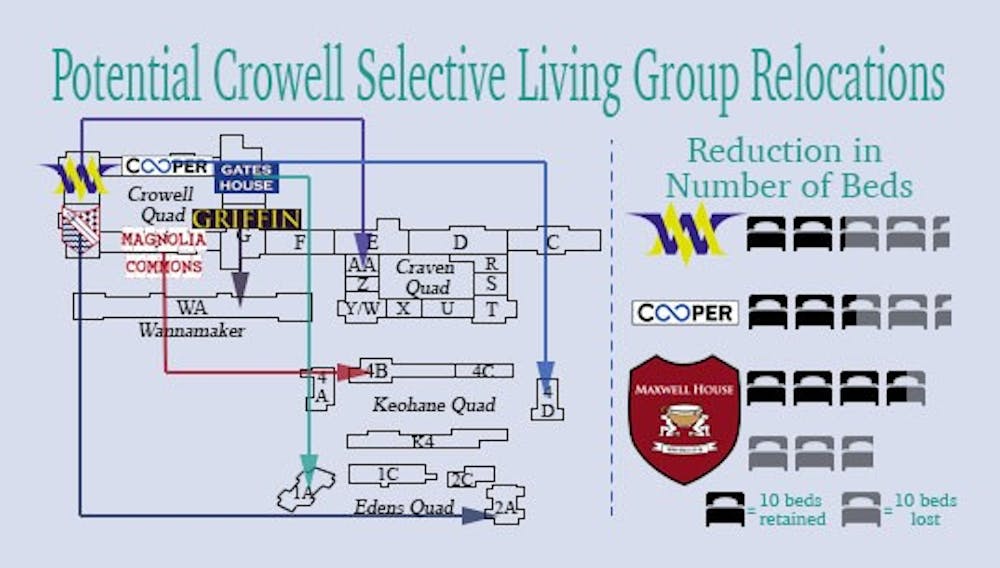If a renovation plan to Crowell residence hall is approved, many students will be relocated—and some selective living groups are not pleased.
Dean for Residential Life Joe Gonzalez explained that the renovation plan—which is pending approval from the Board of Trustees in December—would require the relocation of all six houses in Crowell starting Fall 2017. Housing, Dining and Residence Life strived to keep all the displaced students on West Campus and provide them with a common room, he said.
“We wanted to let Crowell residents know what to expect rather than get surprised in December,” Gonzalez said.
If approved, the renovations will begin May 2017 and will finish August 2018, so students would be allowed to return to Crowell at the start of the 2018-19 academic year.
The potential relocations of SLGs include moving Wayne Manor to Craven AA and Cooper House to Keohane 4D, where Maxwell House currently lives—splitting their space roughly in half. For the independent houses, changes include: Gates House moving to Bel Air House in Edens 1A; Hart House to Edens 2A; Magnolia Commons to Keohane 4B; and Griffin House to Wannamaker where Stark Tower is located.
In turn, these changes could spark subsequent relocations. For example, Powerhouse—an independent group in Craven AA—will be relocated to Craven A in Fall 2017, according to an email Gonzalez sent to current Powerhouse residents.
Although Gonzalez emphasized that the goal was to impact selective living groups and independent houses “proportionally," several SLGs have expressed concerns about the relocation. Notably, the number of beds in the new sections will be reduced.
“I feel like we were sort of told to just deal with it,” said junior Alex Deckey, president of Wayne Manor. “We definitely felt like we weren't getting our fair treatment.”
Gonzalez explained that Wayne Manor would move from a house that has 43 beds to one with 21. Similarly, Cooper’s size would be reduced from 43 beds to 24 beds, and Maxwell would have 35 beds instead of 69 beds.
HDRL will make sure members currently living in these sections—the current juniors—will have a spot in or close to the SLGs’ new houses, Gonzalez promised.
“It has significant impact in terms of how they traditionally operate,” Gonzalez said. “But I think they understand the equity of it.”
Deckey said it would make more sense for HDRL to focus their efforts on keeping SLGs together rather than working to equally affect SLGs and independent houses. Because independent houses have blocks of six people—compared to SLGs where 40 and 70 people reside together—it would be easier for HDRL to relocate them instead of splitting up SLGs.
“They're not trying to find a solution as much as they’re just telling us to deal with it,” Deckey said.
Senior Jake Wirfel, former president of Cooper House, said that he knew his group would have to relocate but expected the new space to be on Central Campus. He said he was not surprised HDRL did not ask for the SLGs’ input when making the decision.
“We were never under any illusion that we were going to be consulted even though we should have been,” he said.
The emphasis that Duke places on selective living groups as an alternative to Greek life is undermined by the fact that Duke plans to relocate them without consulting them—“not a good look for Duke," Wirfel said.
Where new members—next year’s sophomores—will live is another matter of contention. Members who do not have a spot in their SLG’s section will be required to go through the independent housing process, Gonzalez said.
He said that a challenge for SLGs will be determining how to move forward with their recruitment process, knowing that they have a reduced number of beds.
Deckey noted that Gonzalez’s logic for telling them about the potential changes early was to give them time to evaluate how many new members they would take next year. However, Deckey said that not taking new members next year would not be sustainable for Wayne Manor as an organization.
He also said that HDRL is still trying to enforce the “20/Exec Standard,” which states that juniors and seniors have to occupy 20 percent of the house and that three of six HDRL-designated executive members have to live in section. This prevents them from putting all sophomores together in section, which Deckey said they would ideally like to do.
Get The Chronicle straight to your inbox
Sign up for our weekly newsletter. Cancel at any time.
Wirfel added that in recruitment Cooper always guarantees incoming sophomores a place to live in section, which the group will not be able to do this year. Because of the limited spots, many upperclassmen will either have to live off campus or in independent houses.
However, Deckey said that he does not expect the changes in living situation to affect Wayne’s recruitment success.
“Someone will be joining Wayne Manor for the community in Wayne Manor regardless of if we have a section together,” he said.
Wirfel agreed, explaining that he thinks potential new members will see the value of the organization and the advantages that having a renovated section will bring.
“It’s a short term loss for a long term benefit,” he said.

